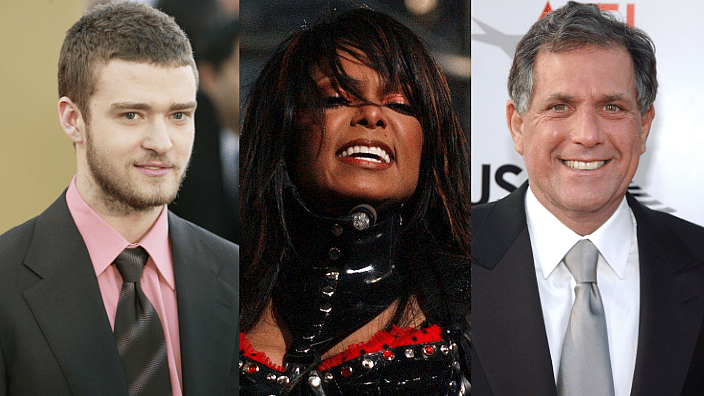Who could forget Super Bowl XXXVIII? It was the day that introduced us to the term “wardrobe malfunction,” but more infamously, it was the day that Janet Jackson was humiliated in front of the world, quite literally, by her co-star Justin Timberlake at the halftime show.
During the highly-anticipated 2004 performance, Timberlake ripped off some clothing from Janet’s outfit, and inadvertently exposed her breast. It was an epic moment in entertainment and sports, severely damaging Jackson’s career for years in the aftermath — while, of course, golden boy Timberlake went merrily on his way and whose career was not damaged in the least.
What we didn’t know then, we do know now thanks to a new Hulu series by way of the New York Times, Malfunction: The Dressing Down of Janet Jackson, that takes an in-depth look at what happened during that fateful day.

For the past few days, Jackson has been trending on Twitter because of the revelations in the series. For me and for most Black women who remember that incident, however, we are not surprised. Black women are used to double standards and stereotypes. We are not granted the same grace as our White counterparts when we err or make career mistakes.
The penalty given to us is always more swift and harsh and lasts much longer — even when we are superstars like Janet Jackson or trailblazers like former U.S. Senator Carol Moseley Braun, who fell from grace over a personal scandal that cost her her U.S. Senate seat in 1998. Moseley Braun’s scandal was far less serious than that of many of her former White male colleagues who are still serving in the Senate 25 years later. That’s because the rules are far more different for them.

The Hulu docu series focuses on Ms. Jackson’s meteoric rise from the time she was a young, budding actress on the sitcom drama, Good Times, to her grand success as a solo artist and entertainer. Most of the project gives us a behind-the-scenes view of how a wealthy, powerful Black woman entertainer could not combat the misogyny and sexism of a male-driven era in sports and entertainment.
What struck me (among many things) about the almost 70-minute-long series was how, once again, only the woman was to blame for something that clearly was done to her.
According to the series, the original plan was for Timberlake to pull off Jackson’s tearaway skirt and reveal a sleek bodysuit underneath. But when they practiced the routine, it didn’t work, and the plan was therefore scrapped.
Apparently, Timberlake wasn’t around to practice very much and that was part of the challenge. According to the series, and those familiar with the rehearsal sessions, Janet Jackson’s wardrobe stylist went shopping for her infamous sunbelt nipple shields. A former halftime producer claimed that Jackson, Timberlake, and the stylist met up in Jackson’s dressing room to choreograph their own plan, one in which Timberlake would rip Janet’s blouse and reveal a lace red bra.
Unfortunately when the real halftime show was live, Timberlake pulled Jackson’s bustier, and instead of the shield, the bra came off too and exposed her bare breast for a few short seconds.
The less than two seconds made television history and set off a firestorm in Jackson’s career and life that lasted for months, and years, despite her apologies over what happened. Network executives like Les Moonves were not satisfied with Jackson’s apologies. Instead they wanted to ruin her career.

Moonves was widely known as mean and vindictive to anyone who crossed him or got in his way. But the series details that he was obsessed with making Jackson pay for what was an accidental wardrobe malfunction. Why? Perhaps because he was embarrassed and CBS sustained a $500,000 fine from the FCC.
But it appears that Moonves’s determination to cause harm to Janet Jackson’s career was more personal. The TV executive reportedly felt that Jackson was not “truly repentant.” How ironic is that Moonves, who was ousted from his job for being an accused serial sexual assault in 2018, was making a fuss over who is repentant or not?
Moonves also reportedly ordered Viacom properties VH1 and MTV (which was the sponsor of the controversial halftime show), and all Viacom-owned radio stations, to stop playing Jackson’s songs and music videos. The move had a huge impact on sales of her album, Damita Jo, which was released in March 2004, just a month after the Super Bowl.

It didn’t end there. Media outlets called Jackson a “trollop,” a “b*tch in heat,” and “deplorable.” If it sounds out of balance and cruel, for less than two seconds of an accidentally exposed breast, it was. If it sounds like there was no equality of punishment, there wasn’t.
If what happened to Jackson happened to her White contemporary, Madonna, for example, it would’ve been dismissed and treated as Madonna simply being provocative. It’s the same with how the public has and continues to treat former U.S. First Lady Michelle Obama and Vice President Kamala Harris. It’s always over the top and out of bounds.
In this instance an iconic Black woman and artist like Janet Jackson was being run down while letting the wardrobe assailant, a White man, get off scot-free. It’s sad that it took almost 20 years for us to get the behind the scenes story, but the great irony is that, in 2021, Janet is doing just fine and Les Moonves is now a disgraced former CBS executive accused of sexual assault.
Ain’t karma ain’t a b*tch?

Sophia A. Nelson is a contributing editor for theGrio. Nelson is a TV commentator and is the author of “The Woman Code: Powerful Keys to Unlock,” “Black Women Redefined.”
Have you subscribed to the Grio podcasts, ‘Dear Culture’ or Acting Up? Download our newest episodes now!
TheGrio is now on Apple TV, Amazon Fire, and Roku. Download theGrio today!


